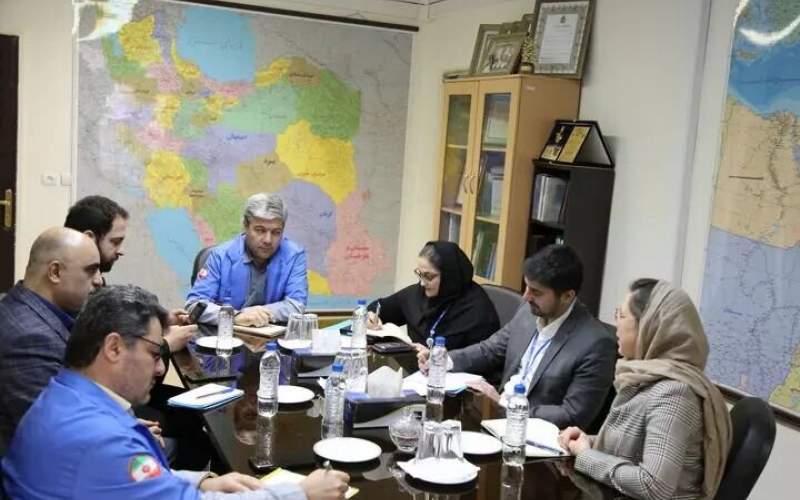The Iran Project
: The United Nations Children’s Fund (UNICEF) in collaboration with the Ministry of Health and Medical Education has provided eight prefabricated healthcare rooms to address health challenges in quake-hit villages in Khoy County.
Friday 26 January 2024 - 14:35
Story Code : 413354
Source : Tehran Times
UNICEF helps health ministry to provide prefab healthcare rooms to Khoy
On January 29, an earthquake with a magnitude of 5.9 on the Richter scale shook the county of Khoy and surrounding areas in the northwestern West Azarbaijan province, leading to the death of at least 3 people and the wounding of hundreds of others.
The earthquake caused significant damage to buildings and infrastructure in Khoy County, leaving communities, women, and children in need of immediate assistance. This included extensive damage to the primary healthcare infrastructure.
The prefabricated healthcare rooms have been provided in response to health challenges facing the affected population, including infants, children, and mothers.
“Some of the health centers faced considerable damage during the earthquake,” the UNICEF website quoted Masoumeh Salahi, head of the Primary Health Services Centre in Firouragh, the epicenter of the earthquake, as saying.
“Therefore, we provided the health care services in the prefabricated rooms. The services we provide here include children’s primary health care, screening, vaccination, pregnancy and postpartum care, and other services,” she added.
Being financially supported by the European Civil Protection and Humanitarian Aid Operations (EU ECHO) and the UN’s Central Emergency Response Fund (CERF), the program was part of the multifaceted response to the earthquake.
UNICEF prior services in Khoy
UNICEF’s support in Khoy County includes a variety of services, from hygiene kits and sanitation facilities to prefabricated health centers and classrooms.
The Ministry of Cooperatives, Labor and Social Welfare, and the State Welfare Organization in collaboration with UNICEF have supported the reconstruction of damaged houses for vulnerable families in the quake-hit city of Khoy.
Unfortunately, people living with disabilities are disproportionately affected during natural emergencies due to their special needs and therefore difficult access to relief services, including shelter, a press release by the UNICEF website on July 10 announced.
By providing financial assistance to 473 vulnerable families with children and disabled members, UNICEF helps them repair their destroyed houses.
The initiative was funded by the European Civil Protection and Humanitarian Aid Operations (ECHO).
Meanwhile, UNICEF’s Water, Sanitation, and Hygiene (WASH) team, in collaboration with the Ministry of Health, Treatment and Medical Education provided 82 prefabricated latrines and shower rooms to the affected households.
“Funded by ECHO, these prefabricated sanitation facilities will ensure high-quality hygiene and sanitation facilities for the families, especially children,” says Sina Saemian, UNICEF WASH Officer.
He went on to add that “Some units will be transferred to UNICEF warehouse to ensure preparedness for any future emergencies.”
In January 2023, the Iranian Red Crescent Society in cooperation with the United Nations Children's Fund (UNICEF) organized eight educational workshops for students and their family members residing in the city of Khoy which was struck by a strong earthquake in the same month.
In November 2023, the Iranian Red Crescent Society in cooperation with UNICEF organized eight educational workshops for students and their family members residing in the city of Khoy.
A total of 1,700 male and female students and 120 of their family members attended these workshops.
These educational workshops were held with the aim of empowering children and their families in team building, team support, anger management, emotion regulation, empathy, happiness, self-care, and environmental care.
During these training programs, facilitators, and members of the IRCS teams, improved their technical skills in emergency preparedness, including providing Mental Health and Psychosocial Support (MHPSS) to children, adolescents, and families during crises, including natural hazards.
On September 11, 2023, UNICEF installed some fabricated classrooms and distributed hygiene and baby kits among people in the earthquake-affected city of Khoy in collaboration with the ministries of education and health.
Four schools in Khoy, affected by the earthquake, were equipped with new educational spaces. Three of these schools were located in inaccessible villages and the fourth one was in Khoy.
UNICEF, in cooperation with the Ministry of Education, facilitated the process of purchasing, delivering, installing, and equipping these prefabricated classrooms to ensure the access of earthquake-affected children to quality education.
These classes are made of thermal isolating materials and are equipped with standard educational equipment and air conditioners for all seasons.
Reporter : Editorial of The Iran Project
# Tags











